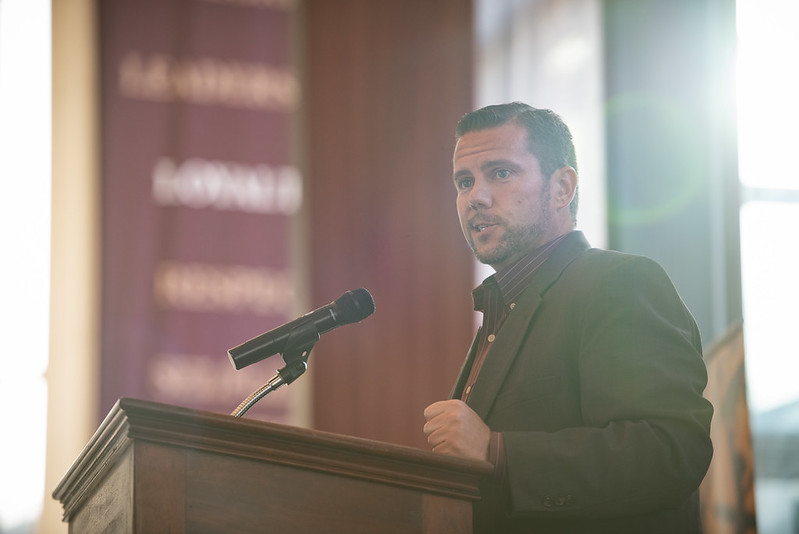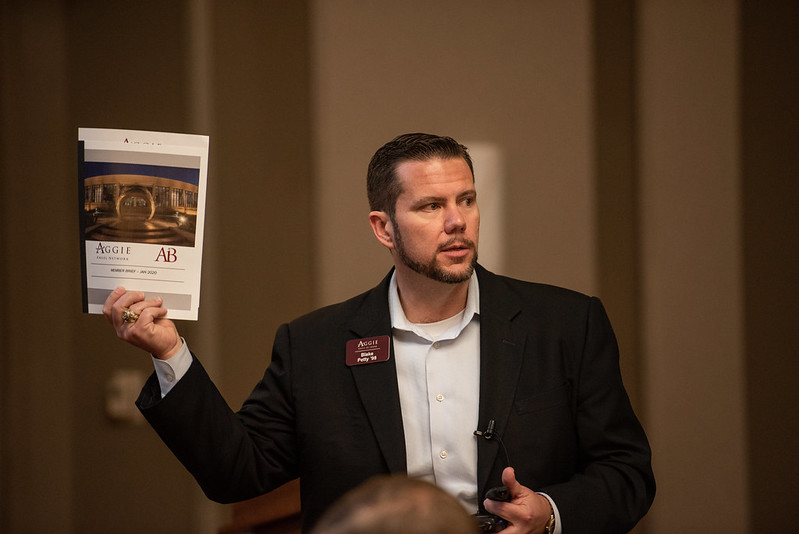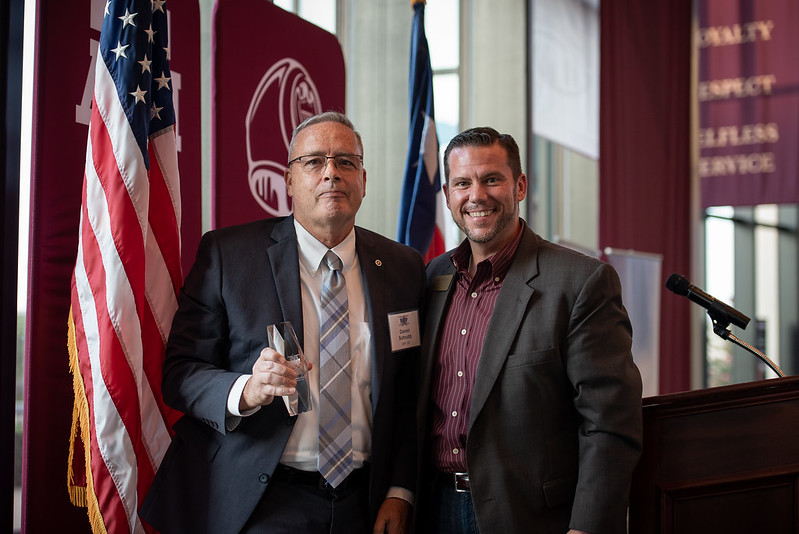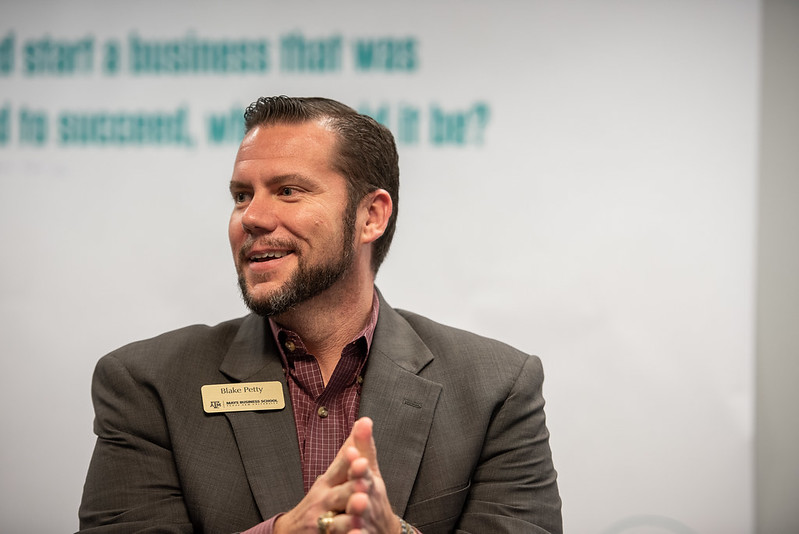Blake Petty ’98 Announced as New Executive Director of McFerrin Center for Entrepreneurship
March 9, 2020
|
Mays Business School
 Blake Petty ’98 was recently announced as the new Executive Director for the McFerrin Center for Entrepreneurship. He joined the McFerrin Center in 2014 but has spent over 20 years working in commercialization and entrepreneurship at Texas A&M University.
Blake Petty ’98 was recently announced as the new Executive Director for the McFerrin Center for Entrepreneurship. He joined the McFerrin Center in 2014 but has spent over 20 years working in commercialization and entrepreneurship at Texas A&M University.
Petty grew up on his family’s farm outside of Waco, Texas. During his time as an undergraduate and master’s student at Texas A&M, Petty studied ecosystem sciences and pursued his passion for the inter-relation of all things of nature. “I always thought I would go back to the family farm and live the agricultural lifestyle. So that’s what I studied. I never really considered business as important to any of that.” he said. Petty was almost through with his Master’s research when he came to a sudden realization. He did not want a career in agriculture. “I came to a real, serious panic moment,” he said.
With graduation fast-approaching, Petty had to quickly pivot and explore new opportunities for his life and career. Fortunately, during his time as a graduate student, he’d built a strong network within the University. “Because A&M is such an amazing school, the people in my degree program actually opened doors for me. I found the licensing job at the commercialization office specific to agriculture,” said Petty.
Petty’s first job after graduating with his Master’s in 2000 was in the Texas A&M Vice President for Research office where he worked on efforts to commercialize technologies and products developed faculty at Texas A&M University. “I remember walking into that job, maybe even in the interview process, and admitting I don’t know how to commercialize these things. I love the science behind it. But you’re talking about business and transitioning from a lab to a marketplace and that is all very confusing and nebulous to me.” said Petty. Although he had only minimally explored the world of commercialization and entrepreneurship prior to his role, he ended up being the perfect fit. He entered the role with zero pre-conceived notions on what could or would succeed in the market which proved invaluable. During his decade long tenure in the position, Petty’s passion for entrepreneurship bloomed. He was enamored by the process a good idea must go through in order to transform into a viable business. He also discovered a serendipitous connection between his life-long passion for ecosystem science and his new-found love for entrepreneurship. “I unexpectedly fell in love with that entire process. I began to recognize components of the entrepreneurial ecosystem inside the University and in the broader local ecosystem” he said. Petty believes the biggest misconception when it comes to being an entrepreneur is that only business-minded individuals can be successful. “I’m living proof that’s not true. Take it from somebody who had no interest or passion in studying entrepreneurship as a student.”
 While in his role at the Vice President for Research’s office, Petty received an invitation to serve as a judge at the MBA Venture Challenge, at the time called the Tech Transfer Challenge. He had never heard of the hosting organization, Center for New Venture and Entrepreneurship; which was renamed the McFerrin Center for Entrepreneurship in 2018 after a generous endowment by the McFerrin Family Foundation. After volunteering as a judge for that one event he knew he wanted to be more involved with CNVE in whatever way he could. “That one program introduced me to the other things that CNVE was doing,” said Petty. Petty later became a member of the CNVE Advisory Council, assisted in the founding Startup Aggieland, and became an active volunteer at CNVE events and programs all before he was formally employed by the Center in 2013. “I wanted to do more with students, which just wasn’t part of my job. I genuinely remember thinking If I ever get the chance to do this work that CNVE is doing; work more with students, do more for the veteran entrepreneurs, I would love a job like that. I never thought that would be a possibility or a career track for me” said Petty.
While in his role at the Vice President for Research’s office, Petty received an invitation to serve as a judge at the MBA Venture Challenge, at the time called the Tech Transfer Challenge. He had never heard of the hosting organization, Center for New Venture and Entrepreneurship; which was renamed the McFerrin Center for Entrepreneurship in 2018 after a generous endowment by the McFerrin Family Foundation. After volunteering as a judge for that one event he knew he wanted to be more involved with CNVE in whatever way he could. “That one program introduced me to the other things that CNVE was doing,” said Petty. Petty later became a member of the CNVE Advisory Council, assisted in the founding Startup Aggieland, and became an active volunteer at CNVE events and programs all before he was formally employed by the Center in 2013. “I wanted to do more with students, which just wasn’t part of my job. I genuinely remember thinking If I ever get the chance to do this work that CNVE is doing; work more with students, do more for the veteran entrepreneurs, I would love a job like that. I never thought that would be a possibility or a career track for me” said Petty.
Petty says that there’s something special about student entrepreneurs that makes them particularly inspiring. “There is untold potential with these students” he commented, “I don’t know if it’s their youth or their passion. They envision themselves launching, growing, and owning a business around what they love. If I can help them through the process…I can’t even begin to imagine where they’re going to go with it. It’s not just exciting. It’s inspirational, it almost makes me feel lazy”. This says a lot, considering Petty is not only the Executive Director of McFerrin Center for Entrepreneurship but also serves as the Executive Director for the Aggie Angel Network, and a lead faculty for NSF I-Corps.
Now, in 2020 Petty has achieved what many people hope to find in their career. “I’m doing what I love.” he stated.

Within the past decade and a half, there has been an entrepreneurial gold-rush in the world of higher education. Where there once were few to no resources for student entrepreneurs, it seems now that nearly every campus in the nation has a center, maker-space, or opportunity for innovative students to explore entrepreneurship. When asked where he thinks this boom came from, Petty stated quite matter of fact: the students. “It’s all driven from the students themselves. It’s from the entrepreneurs on campus saying hey, I’m going to keep creating and by gosh I’ll do it on my own if you’re not going to help me.”
Students now have a variety of ways to grow their skills as entrepreneurs while they pursue their degree. Gone are the days where you had to decide between continuing your education and starting your business. When students have a plethora of options around the country, what is it that makes the McFerrin Center special? And furthermore, what makes Texas A&M an exceptional choice for young entrepreneurs? Petty commented that there are 2 reasons Texas A&M stands out for entrepreneurs: shared values and that entrepreneurship is a part of Texas A&M’s history.
“We’re drawn to entrepreneurs of our type. Which boils down to Aggie entrepreneurs. Entrepreneurs who are attracted to Texas A&M because they felt an intrinsic connection with the University’s culture and core values.” said Petty. “I think we can all agree Aggies are unique. We operate differently. We think differently. We even behave differently whether that’s in business or otherwise. Entrepreneurs with a pedigree from Texas A&M don’t have to focus on maintaining the core values. If they did it right as students here, those core values are instilled in them.” Petty also commented that entrepreneurs who are involved with the McFerrin Center for Entrepreneurship are challenged in more ways than their counterparts at other schools. “We’re requiring that you not just be entrepreneurial but also think about how you are a leader as an entrepreneur and how you show respect as an entrepreneur. We’ve built a uniquely Aggie center for Aggie entrepreneurs.”
Texas A&M has a rich history in agriculture and engineering which has inadvertently attracted innovative individuals to the University. “Somebody told me once that A&M has entrepreneurship in its blood.” said Petty, “We were the agricultural school in Texas. The earliest classes of students coming here were leaving the family farm, and coming and learning more, probably farming skills, and going back and having to take over and run the family farm. Much like the path I thought I would take.” Petty went on to note that although these young farmers didn’t call themselves entrepreneurs and didn’t take traditional business courses they sought out the education of Texas A&M to make their livelihood better, more efficient, and more lucrative. These inaugural Aggies refused to be held prisoner to the constraints that their forefathers operated under. “I think you could argue that our DNA has entrepreneurship from the very first class of 1876. We had entrepreneurs on this campus, whether they called themselves that or not.”

Although the McFerrin Center for Entrepreneurship coaches entrepreneurs that they can’t “boil the ocean” meaning they can’t lose focus on the present and try to tackle everything at once, I asked Petty to take a moment and imagine what he hopes McFerrin Center will accomplish within the next 10-15 years. Petty imagines the McFerrin Center serving not just current students, but former students, prospective students, and even non-students who have a connection to Texas A&M. “If this is a business and they are seeking out resources, why wouldn’t we play a role in facilitating their success?” Petty stated. “The principles we teach, the skills we impart, and the network that we’ve automatically built amongst a very unique set of Aggie entrepreneurship experts. That’s something unique to us. That’s our value proposition. But that should not only be available for students, trying to launch a business, while currently enrolled at Texas A&M.”
In addition, Petty hopes that McFerrin Center can help to better educate students about what it actually means to be an entrepreneur and the value that entrepreneurship can provide them, regardless of the career path they plan to pursue. “Entrepreneur is a mysterious, confusing, even sometimes hard to spell word.” said Petty, “What it actually means is a problem solver. There are tremendous skills taught to people at this school. And if students are using those skills to solve a problem then they are being entrepreneurial. You don’t have to have the title of founder or entrepreneur. I tell the students who say “I’m not an entrepreneur”. It’s fine if you want to think that. However, if you are a problem solver, if you aren’t comfortable working under the constraints given to you, and you’d rather make things easier, better, cheaper, faster, and not live with the status quo then you have an entrepreneurial attitude and we can help you express that in whatever way you want to.”
Petty firmly believes that Aggies are sought after upon graduation because the university attracts entrepreneurial individuals. “To be honest companies, big companies, want to recruit Aggies because Aggies make great workers and I think Aggies are naturally more entrepreneurial.” Petty also comments that it’s up to you to decide if you want to act upon your skills as an entrepreneur. “If you’re sitting in a cubicle in a huge organization you can choose to be entrepreneurial or not through the way that you solve problems, through the way that you capture value, through the way that you bring value to others. Or, you can choose not to.”
More than anything, Petty hopes that the McFerrin Center can introduce entrepreneurship to more students, more individuals, and more Aggies. This is not a goal for vanity metrics or to increase the McFerrin Center’s rankings among the nation, but because he himself is a testament to how entrepreneurship can shape your life in unexpected and powerful ways. He hopes that regardless of a student’s major, background, or pre-conceived notion of entrepreneurship they find a community and common ground in the entrepreneurial ecosystem at Texas A&M. “Entrepreneurship research for decades has proven that a blend of skills, backgrounds, and interests is a critical component of a successful organization. That’s why our programs are open to the entire campus. We get so excited about the collisions that we create between students of different majors, who may have never interacted with each other. I’ve heard students tell each other I didn’t know that was a major. If they’re doing that in an environment that allows them to collide, collaborate, and even fail together and to come up with other ideas and pursue other interests. That’s entrepreneurship to me.”


